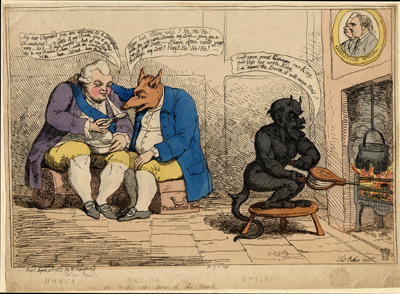Bonus Melior Optimus. . .
This is one of a flurry of prints about the infamous Fox-North coalition which was hated by the king and justifiably regarded as brazenly opportunistic by nearly everyone else because of the well-known and long-standing hostility of the principal members.
The Latin of the title can be translated as "Good, Better, Best" so the full title of the print is in effect Good, Better, Best, or the Devil's the Best of the Bunch. It shows Lord North (Good) and Charles James Fox (Better) sharing hot broth, and the Devil (Best) stoking the fire to make it even hotter. The very ironic message of the title seems to be that even the devil would be preferable to Fox and North as leaders of the new administration. But if that is so, the message is (at best) greatly complicated or (at worst) mostly obscured by other details in the print.

© Trustees of the British Museum
The verbal triad of good, better, best, for instance, is belied by the visual organization of the print which falls into two not three distinct groups: one group consisting of Fox and North facing one another with Fox's arm joining them; the other group consisting of the devil and fireplace surmounted by the "Coalition Medal," (based on the James Sayer's print portraying North and Fox) on the wall.
On the left side of the print, Fox is identified in the older tradition of satiric prints with a fox head. The better known North appears as a caricature portrait. But again in an awkward return to an older tradition, North is also shown conspicuously blowing on the broth, an action which has been interpreted as an allusion to Boreas, the North wind.
As the British Museum commentary suggests, however, there is another allusion, this time in the text, about blowing hot and cold "with the self-same Breath." The allusion is to Aesop's Fable of "The Satyr and the Traveller," which was usually understood in the 18th century as an illustration of inconstancy and double dealing. Both could be applied to North's behavior in joining the Coalition. Indeed the King saw it as double-dealing and betrayal of the worst sort, since North was well-acquainted with the King's antipathy to Fox. But like the allusion to the North wind, the textual reference to Aesop's fable is fairly obscure and, in this case, completely unsupported by any visual evidence.
Fox's text bubble articulates the reason for the King's antipathy, namely that Fox had spent much of his time in the Commons repeatedly attacking the King's (and Lord North's) policy towards America: "I have often cool'd your Porridge, my Lord."
North is sitting on a scroll labeled "Budget" which may refer to the mounting debt from North's pursuit of the American war. Fox, for his part, is sitting upon "Pandora's Box," yet another allusion for the viewer to process—this time suggesting untold evils which could spring from Fox's role in the coalition.
Finally, there is the devil who is mentioned in North's text bubble as his "Cook," and consequently the presumed creator of the highly seasoned broth that North and Fox will now share. The Devil's text bubble begins as a parody of the British national anthem (God save our King) in which the devil (significantly) cannot bring himself to mention either God or King. But it ends with the frustrated realization that this broth (directly beneath Sayers' Coalition Medal) will never really be ready for consumption.
Gillray is justifiably famous among his fellow caricaturist for his allusiveness, for creating multiple frames through which to view his prints, and for the resulting complexity of the finished product. But with all that, there is usually a sense of a visual and artistic whole to which everything contributes. In Bonus Melior Optimus there are simply too many allusions taking the viewer in too many directions with too much labor for too little result. One hopes that the invention of the print, ascribed to one Thomas Pether, is, in fact, authentic, and not simply a Gillray alias. That would provide a welcome excuse for a print that is far from optimal.
Sources and Reading
- Commentary from the British Museum on Bonus Melior Optimus. . .
- "Charles James Fox," Wikipedia
- "Frederick North, Lord North," Wikipedia
- "Fox-North coalition," Wikipedia
- "The Satyr and the Traveller," Wikipedia
Comments & Corrections
NOTE: Comments and/or corrections are always appreciated. To make that easier, I have included a form below that you can use. I promise never to share any of the info provided without your express permission.